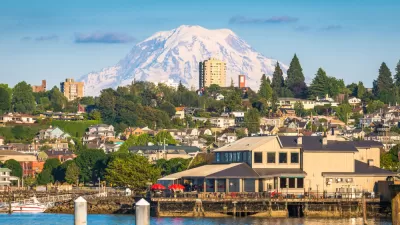Local leaders hope that streamlining permit processes and eliminating restrictive zoning regulations will set the groundwork for increased production of small and mid-sized multi-family housing.

As cities across the Commonwealth look to zoning reform to accommodate higher density and create more housing stock, Wyatt Gordon examines the "missing middle housing" programs being implemented in Norfolk and Arlington, both exploring options for expanding allowable housing types.
As covered here last week, Norfolk has published a Missing Middle Pattern Book designed to make new housing development more streamlined and affordable. "People often visualize adding more units means that the building will get bigger and bigger, but some of the examples identified in the pattern book demonstrate that you can have a house-scale building with multiple units in it," says Dan Parolek, author of Missing Middle Housing.
Meanwhile, Arlington, where 75 percent of residential land is zoned for single-family homes, is considering relaxing its zoning code to allow a broader diversity of multi-family buildings. According to Arlington's comprehensive planning section supervisor, Kellie Brown, "[t]he existing zoning doesn’t allow for more missing middle housing, so there are limited opportunities to increase our housing supply under many local ordinances today." Creating the opportunity for more housing means reforming other restrictive regulations such as parking requirements and minimum lot sizes.
"This is about meeting a need because developers are struggling to produce single-family homes at attainable price points,' says Parolek. "COVID was just the fuel on the fire of already increasing housing prices, meaning cities need to think creatively about how to deliver more housing for residents."
FULL STORY: How to bring the ‘missing middle’ to Virginia housing development

Alabama: Trump Terminates Settlements for Black Communities Harmed By Raw Sewage
Trump deemed the landmark civil rights agreement “illegal DEI and environmental justice policy.”

Study: Maui’s Plan to Convert Vacation Rentals to Long-Term Housing Could Cause Nearly $1 Billion Economic Loss
The plan would reduce visitor accommodation by 25% resulting in 1,900 jobs lost.

Planetizen Federal Action Tracker
A weekly monitor of how Trump’s orders and actions are impacting planners and planning in America.

Waymo Gets Permission to Map SF’s Market Street
If allowed to operate on the traffic-restricted street, Waymo’s autonomous taxis would have a leg up over ride-hailing competitors — and counter the city’s efforts to grow bike and pedestrian on the thoroughfare.

Parklet Symposium Highlights the Success of Shared Spaces
Parklets got a boost during the Covid-19 pandemic, when the concept was translated to outdoor dining programs that offered restaurants a lifeline during the shutdown.

Federal Homelessness Agency Places Entire Staff on Leave
The U.S. Interagency Council on Homelessness is the only federal agency dedicated to preventing and ending homelessness.
Urban Design for Planners 1: Software Tools
This six-course series explores essential urban design concepts using open source software and equips planners with the tools they need to participate fully in the urban design process.
Planning for Universal Design
Learn the tools for implementing Universal Design in planning regulations.
Caltrans
Smith Gee Studio
Institute for Housing and Urban Development Studies (IHS)
City of Grandview
Harvard GSD Executive Education
Toledo-Lucas County Plan Commissions
Salt Lake City
NYU Wagner Graduate School of Public Service





























